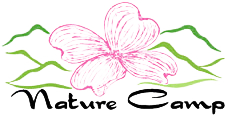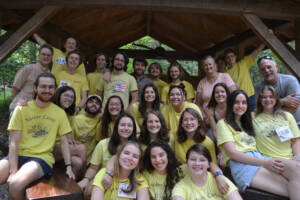Each year Nature Camp seeks diligent, hard-working, dedicated, enthusiastic individuals with a passion for natural history, the out-of-doors, and the enrichment of youth to serve on our summer staff. Interested individuals should read the information and guidelines, below.
The application deadline for summer 2024 is 16 February 2024.
Information and Guidelines for Prospective Staff Members
Please read the following before submitting an application for employment.
Response to COVID-19
Prospective staff members are strongly encouraged to get vaccinated against COVID-19 and to receive any and all recommended booster injections, as appropriate, before the summer. Nature Camp reserves the right to require all participants (including staff) to show proof of up-to-date vaccination against COVID-19 and/or to submit a negative COVID test the day of arrival. In addition, regular on-site testing of staff during the summer may be implemented.
More information about Nature Camp’s response to the ongoing pandemic is available on a dedicated COVID information page on the website and in a set of FAQs. Both pages will be updated throughout the winter and spring as Nature Camp receives additional guidance from the Virginia Department of Health, the Centers for Disease Control and Prevention, the American Camp Association, and the Alliance for Camp Health.
Mission of Nature Camp
Nature Camp is a private, non-profit, overnight, coeducational summer camp specializing in natural history and environmental education for youth. Since 1942 Nature Camp has sought to train a corps of interested and knowledgeable youth, in grades 5 through 12, to conserve and protect the environment and to become wise stewards of the natural resources of the earth. Nature Camp operates under Special Use Permit from the U.S. Forest Service. Located in the George Washington National Forest in the Blue Ridge Mountains of Rockbridge County in western Virginia, Nature Camp seeks to foster an appreciation for and love of nature through hands-on, outdoor, experiential learning. In so doing we hope to inspire the young people of today to become environmentally responsible and conscientious citizens of tomorrow, to spark a lifelong love of learning, and to forge a deep and abiding attachment to the natural world.
Educational Program
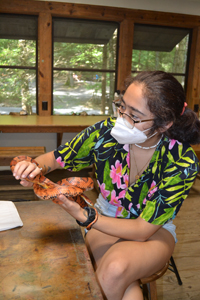 The core program of Nature Camp consists of a curriculum of classes in various subjects in natural history and related environmental topics. Resident counselors also serve as class instructors. (Please note that Nature Camp does not employ staff members who serve only as class instructors.) Several classes are offered in some form nearly every summer, including botany, entomology (the study of insects), geology, herpetology (the study of reptiles and amphibians), limnology (the study of freshwater ecosystems), mycology (the study of fungi), nature journaling, and ornithology (the study of birds). Other frequently taught subjects include astronomy and ecology. Classes in communication, dendrology (the study of trees), environmental history/philosophy, evolutionary biology, geography, invertebrate biology, meteorology, and reproduction have been offered at least once in the past decade or two. In years past Nature Camp had an active program in archaeology and, later, anthropology.
The core program of Nature Camp consists of a curriculum of classes in various subjects in natural history and related environmental topics. Resident counselors also serve as class instructors. (Please note that Nature Camp does not employ staff members who serve only as class instructors.) Several classes are offered in some form nearly every summer, including botany, entomology (the study of insects), geology, herpetology (the study of reptiles and amphibians), limnology (the study of freshwater ecosystems), mycology (the study of fungi), nature journaling, and ornithology (the study of birds). Other frequently taught subjects include astronomy and ecology. Classes in communication, dendrology (the study of trees), environmental history/philosophy, evolutionary biology, geography, invertebrate biology, meteorology, and reproduction have been offered at least once in the past decade or two. In years past Nature Camp had an active program in archaeology and, later, anthropology.
Classes meet twice daily, except on the middle Sunday and the final Friday of each session (and Independence Day, which occurs during Second Session). Class periods last 90 minutes—9:15 to 10:45 in the morning and 2:15 to 3:45 in the afternoon. At the beginning of each session, campers choose one subject as their major class. This class forms a group that attends all classes together. Major classes meet on Tuesdays, Thursdays and the first Saturday, for a total of 15 hours of instruction. Mondays, Wednesdays and the first Friday are minor class days. Minor classes meet just once, and each class group rotates among the subjects other than its major. A full curriculum of classes therefore consists of 11 subjects; this number ensures that each class group will have one minor class period in each subject. Instructors thus have the opportunity to get to know a group of campers over the course of two weeks and explore a particular subject in depth, but they also present essentially the same material up to ten times a session to every other major class group.
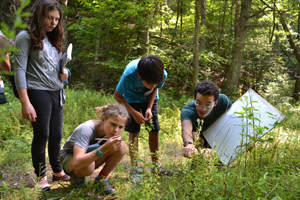 For each class—minor and major—campers are assigned a project which is designed to expand on the material covered in class, to allow the campers to explore a particular topic in greater depth, and to provide them with tangible evidence of what they learned at Nature Camp and what they are capable of doing. These projects are typically written, and in general campers should be capable of completing each project in about one to one-and-a-half hours, depending on the age group. Projects often require some research in the Nature Camp library, but may begin with direct observations out-of-doors.
For each class—minor and major—campers are assigned a project which is designed to expand on the material covered in class, to allow the campers to explore a particular topic in greater depth, and to provide them with tangible evidence of what they learned at Nature Camp and what they are capable of doing. These projects are typically written, and in general campers should be capable of completing each project in about one to one-and-a-half hours, depending on the age group. Projects often require some research in the Nature Camp library, but may begin with direct observations out-of-doors.
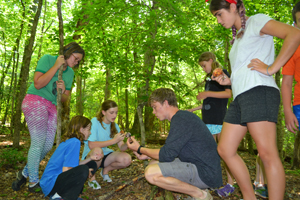 Nature Camp emphasizes hands-on, experiential, frequently field-based education. Campers learn in a variety of settings, including classrooms both inside and out, but also behind the eyepieces of binoculars and microscopes, knee-deep in a cold stream, running behind a butterfly net, and on hands and knees with eyes peeled on the ground. Nature Camp is surrounded on three sides by several thousand acres of National Forest land, which provides us with an extensive outdoor classroom of forested mountains and streams. Sit-down lectures or discussions can certainly be appropriate learning tools, and campers do expect to take some notes in class, but instructors should include a significant field component, especially for major classes, and should take full advantage of the extraordinary environment available for teaching and learning. An apt “litmus test” for possible class topics and activities is to consider whether the proposed material could just as easily be taught inside as out or somewhere other than at Nature Camp. Failure to pass either component suggests that the material or the pedagogical approach may not be ideally suited for teaching at Nature Camp.
Nature Camp emphasizes hands-on, experiential, frequently field-based education. Campers learn in a variety of settings, including classrooms both inside and out, but also behind the eyepieces of binoculars and microscopes, knee-deep in a cold stream, running behind a butterfly net, and on hands and knees with eyes peeled on the ground. Nature Camp is surrounded on three sides by several thousand acres of National Forest land, which provides us with an extensive outdoor classroom of forested mountains and streams. Sit-down lectures or discussions can certainly be appropriate learning tools, and campers do expect to take some notes in class, but instructors should include a significant field component, especially for major classes, and should take full advantage of the extraordinary environment available for teaching and learning. An apt “litmus test” for possible class topics and activities is to consider whether the proposed material could just as easily be taught inside as out or somewhere other than at Nature Camp. Failure to pass either component suggests that the material or the pedagogical approach may not be ideally suited for teaching at Nature Camp.
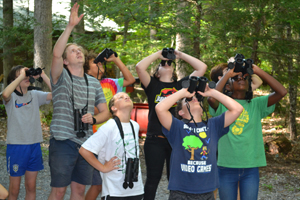 Most classes are team taught by a pair of instructors; new counselors are typically teamed with experienced staff members. Although Nature Camp seeks to employ well qualified instructors, interest in a subject and a passion for teaching are more important credentials than thorough knowledge of the material or the ability to identify every species in a particular discipline. Although every staff member should spend some time thinking about their class and brainstorming activities and lessons before the summer begins, we devote considerable time to preparing for classes during the week before the first session of campers arrives. During this time the director works with each set of instructors to develop a “syllabus” appropriate for each class, provide or recommend resources to assist in class preparation, and lend advice and suggestions for subject matter, activities, and field excursions as possible. At the end of this week, instructors will be expected to have prepared minor and major project assignments, an outline of the minor class material, and a tentative schedule for major classes.
Most classes are team taught by a pair of instructors; new counselors are typically teamed with experienced staff members. Although Nature Camp seeks to employ well qualified instructors, interest in a subject and a passion for teaching are more important credentials than thorough knowledge of the material or the ability to identify every species in a particular discipline. Although every staff member should spend some time thinking about their class and brainstorming activities and lessons before the summer begins, we devote considerable time to preparing for classes during the week before the first session of campers arrives. During this time the director works with each set of instructors to develop a “syllabus” appropriate for each class, provide or recommend resources to assist in class preparation, and lend advice and suggestions for subject matter, activities, and field excursions as possible. At the end of this week, instructors will be expected to have prepared minor and major project assignments, an outline of the minor class material, and a tentative schedule for major classes.
Responsibilities of Staff Members
In addition to teaching responsibilities, counselors are assigned daily duties necessary to keep the camp running smoothly. These duties, which rotate during each session, include washing dishes after meals; supervising campers in the library, laboratory, and swimming pool; organizing and leading recreational activities, and directing campers in their duties. On days when they are not assigned specific duties, counselors should spend most of their available time outside of class with the campers. The staff also thoroughly cleans the camp facilities every two weeks between sessions.
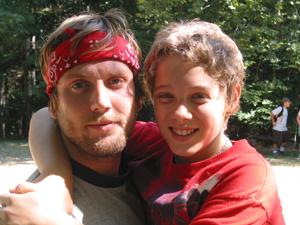 The entire camp assembly eats three meals together daily in a central dining hall. Counselors are assigned to tables with campers. Staff members are expected to attend all meals, as well as evening programs and non-sectarian chapel services on Sundays, and to participate in all-day hikes on the middle Sunday of each session.
The entire camp assembly eats three meals together daily in a central dining hall. Counselors are assigned to tables with campers. Staff members are expected to attend all meals, as well as evening programs and non-sectarian chapel services on Sundays, and to participate in all-day hikes on the middle Sunday of each session.
Days spent working at Nature Camp are long and tiring, often beginning before Reveille at 7:30 AM and often extending well past Taps (typically 10:00 to 10:30 PM, depending on the age of the session). We tell prospective campers and their parents that individuals seeking a purely recreational experience will not be happy at Nature Camp, and the same is certainly true for staff members as well. Unequivocal commitment to the ideals of Nature Camp and a strong work ethic are even more important for staff. Counselors are expected to act professionally at all times, to uphold standards of personal conduct and appearance, and to remember that their primary responsibility is not to themselves but to the campers—to care for, teach, nurture, guide, excite, and inspire them. The staff projects the public image of Nature Camp at all times and serve as role models for the campers. Any staff member who fails to maintain professional demeanor and behavior or whose self-interest consistently interferes with their ability to meet expectations will be dismissed.
Qualifications
Nature Camp is first and foremost an educational camp, and it is the emphasis on natural history and environmental studies which truly sets us apart. Hence three important qualifications for summer employment are a passion for teaching, breadth and depth of knowledge of the biota of Nature Camp and vicinity (plants, birds, herps, insects, etc.), and an infectious interest in natural history and outdoor learning. Yet the much larger portion of each day at Nature Camp is spent outside of designated class periods. Therefore other qualifications are at least as important as teaching ability and knowledge of a particular subject. These include
-
- ability and interest to work with, engage, supervise, and inspire youth
- the desire to promote positive youth development and serve as a role model and inspiration for adolescents
- the flexibility and amicability to work cooperatively and share living space with other staff members
- commitment to teamwork
- the ability to express oneself clearly and effectively
- maturity, integrity, self-discipline, self-confidence and professionalism.
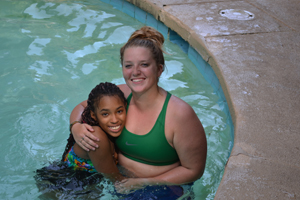 Extensive experience working with children, teaching in supervised settings, or working at other summer camps generally elevates one’s qualifications. Other characteristics of strong candidates for staff positions include extensive coursework or research experience in a field related to a Nature Camp class and superlative recommendations from references. The staff comprises several certified lifeguards each summer, and this qualification will also improve one’s standing as an applicant.
Extensive experience working with children, teaching in supervised settings, or working at other summer camps generally elevates one’s qualifications. Other characteristics of strong candidates for staff positions include extensive coursework or research experience in a field related to a Nature Camp class and superlative recommendations from references. The staff comprises several certified lifeguards each summer, and this qualification will also improve one’s standing as an applicant.
A cohesive, amiable, gregarious and hardworking staff enhances the quality of the experience for campers. Everyone who works at Nature Camp should have a great time; the fun that you have will infectiously rub off on the campers.
Most staff members are college students or recent graduates, but in some instances recent high school graduates who have particularly distinguished themselves as exceptional campers may be considered for employment.
General Information
The summer staff typically numbers about 25. In addition to general (bunkhouse) counselors (including head counselors), the summer staff comprises an assistant director, two cooks, canteen operator, emergency medical technician/nurse, and office assistant. (Except in rare circumstances only veteran staff members hold these other positions.) Ideally the staff will represent a range of age, experience, and familiarity with Nature Camp. Returning staff members generally receive precedence in consideration for employment, but new counselors, including those who have never been to Nature Camp before, are always welcome.
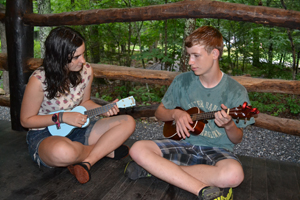 The summer schedule at Nature Camp consists of four, two-week sessions from mid-June to mid-August. (See below for specific dates for this upcoming summer.) The staff congregates the Monday before First Session begins for six days of staff orientation and training in policies and protocol, working with campers and with one another, and CPR and First Aid; class preparation; and getting the facilities ready for the summer. A shorter period after the close of Fourth Session is devoted to conducting a complete inventory of equipment and supplies and to preparing the facilities for the winter. (These opening and closing weeks count as full weeks in computing staff salaries.) In hiring staff strong preference is given to individuals who can serve for the entire 10-week period. The opening week before First Session is absolutely critical for new staff members, and rarely is any applicant considered who cannot be present for that entire period.
The summer schedule at Nature Camp consists of four, two-week sessions from mid-June to mid-August. (See below for specific dates for this upcoming summer.) The staff congregates the Monday before First Session begins for six days of staff orientation and training in policies and protocol, working with campers and with one another, and CPR and First Aid; class preparation; and getting the facilities ready for the summer. A shorter period after the close of Fourth Session is devoted to conducting a complete inventory of equipment and supplies and to preparing the facilities for the winter. (These opening and closing weeks count as full weeks in computing staff salaries.) In hiring staff strong preference is given to individuals who can serve for the entire 10-week period. The opening week before First Session is absolutely critical for new staff members, and rarely is any applicant considered who cannot be present for that entire period.
Staff members must submit to criminal background and sex offender registry checks and complete a health form. Accepted applicants will receive instructions for completing requisite forms.
Summer staff members receive a weekly salary, which varies with experience, education, and position. Staff members are paid in three installments during the summer: at the beginning of First Session, at the end of Second Session, and at the end of Fourth Session. All staff members receive one day off per week, as well as roughly 20 hours off every two weeks between sessions (Saturday afternoon to Sunday morning).
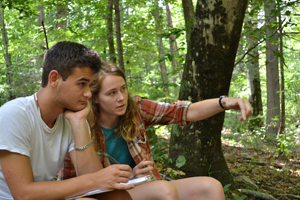 Most staff members reside with the campers in separate, single-gender bunkhouses; there is also a smaller space (in one wing of the office building) designated as gender-inclusive housing. Because personal space is limited, counselors should refrain from bringing an excess of unnecessary items. A single laundry room with two washers and two dryers is available to all staff. A shared counselors’ room has wireless fiber-optic internet access. Other facilities include male and female bathhouses (known as “T-houses”) with hot showers (a single-use bathroom with shower is available for residents of the gender-inclusive housing space); staff house, which contains the central office; health center; educational building with well-stocked library, museum, and lab; canteen, or camp store; and chlorinated swimming pool. A playfield provides space for such games as Frisbee and kickball and is bordered by rustic volleyball, tetherball, and basketball courts and horseshoe pits.
Most staff members reside with the campers in separate, single-gender bunkhouses; there is also a smaller space (in one wing of the office building) designated as gender-inclusive housing. Because personal space is limited, counselors should refrain from bringing an excess of unnecessary items. A single laundry room with two washers and two dryers is available to all staff. A shared counselors’ room has wireless fiber-optic internet access. Other facilities include male and female bathhouses (known as “T-houses”) with hot showers (a single-use bathroom with shower is available for residents of the gender-inclusive housing space); staff house, which contains the central office; health center; educational building with well-stocked library, museum, and lab; canteen, or camp store; and chlorinated swimming pool. A playfield provides space for such games as Frisbee and kickball and is bordered by rustic volleyball, tetherball, and basketball courts and horseshoe pits.
Nature Camp is located in a narrow mountain valley. It is not uncommon to experience high temperatures in the 90s and lows in the 50s or occasionally even 40s during the summer. Humidity is nearly constantly high during the summer, and limited direct sunlight delays the drying of anything.
Spiritual Element
Nature Camp is not a religious camp and has no religious affiliation. Nevertheless spiritual practices have always had a vital and integral place. Staff members lead grace before every meal, we gather in a reflective and meditative Friendship Circle at the end of every day, and non-sectarian services are held on Sundays in the open-air, stone-hewn Reeves Memorial Chapel. Staff members are expected to respect these traditions and the religious beliefs of all campers and other staff members, to attend all chapel services and to take turns delivering inspirational chapel talks. Nature Camp attempts to maintain these traditions in a manner that is neither obtrusive nor confrontational.
Timeline of the Hiring Process
Interviews with prospective staff members will begin in mid to late February. Not all applicants may be selected for interviews, depending on the size and quality of the applicant pool and the number of positions to fill. Those applicants who are selected for interviews will be notified via e-mail and invited to sign up for a time slot. Interviews are conducted, whenever possible, using Zoom.
Hiring decisions will be made after all interviews and reference and employment checks are completed. Every effort will be made to finalize decisions and notify all applicants by March 31.
Spring Expectations
Although formal (on-site) employment does not begin until early June, all staff members are expected to complete several tasks and assignments and participate in cooperative planning for the summer in the weeks between March and June. Expectations include
- authorization for Nature Camp to conduct criminal background check and check of sex offender registries
- completion of ~8-10 hours of online training
- reading the Nature Camp staff manual (which will be provided serially via a set of e-mails)
- participation in one or more virtual staff meetings via Zoom
- initial class planning and preparation with co-instructor
All staff members should expect to spend an average of 1-2 hours per week fulfilling these requirements in April and May. If you are unable to meet these expectations, please do not apply for employment.
2024 Dates
June 6 – June 10—Adult Session (optional)
June 10 (Monday)—Staff reports
June 16 – June 29—First Session (grades 10-11-12)
June 30 – July 13—Second Session (grades 8-9)
July 14 – July 27—Third Session (grades 7-8)
July 28 – August 10—Fourth Session (grades 5-6)
August 14—Staff departs
Please direct any questions or inquiries to:
Philip Coulling (director [“at” symbol] naturecamp.net)
310 Enfield Rd.
Lexington, VA 24450
